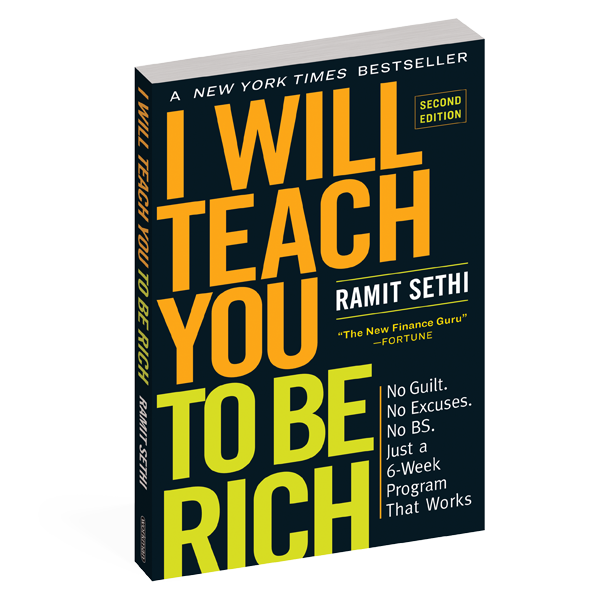In this post, I’ll review Ramit Sethi’s I Will Teach You To Be Rich, and highlight useful notes from the book.
Because this book covers an extremely wide amount of topics, I’m only going to be highlighting the points I’ve found most interesting in this post. I’ll skip a lot of topics the book covers, like paying off debt, how to get a raise, etc. where it isn’t relevant to me personally but might be very useful to you.
As such, please read this just to get a sense of what this book’s about as opposed to a comprehensive summary.
If the author’s philosophy intrigues you, go ahead a buy his book with my Amazon affiliate link here. The affiliate link will throw a couple bucks my way, at no cost to you, which will keep this site running.
If you’re new to personal finance, I’d say his book is definitely worth the investment and you should just buy it without reading the rest of my post. This is because at 7 bucks, it’s an extremely cheap way to be able to get the knowledge that’ll help put your finances together for the rest of your life. A large Starbucks cost more than this book – and this book won’t give you diabetes.
Table Of Contents
Optimizing Credit Cards
The below is a review and summary of some interesting notes I took about optimizing your credit cards in I Will Teach You To Be Rich.
One thing I didn’t know you could do with credit cards is to waive your credit card fees. This include late fees and/or annual credit card fees. The author’s got a few tips on doing this successfully.
First, don’t ask. Tell them to remove the fees. So instead of “can you please remove my fees?” say “I’d like to have this fee removed.” The author also advises you to leverage your existing relationship with your credit card so you can threaten them with it.
- For example, if you’ve used a credit card for 7 years and you forgot to pay one time, it should be a professional courtesy of the credit card company to waive your late fees. If they don’t, you can just heavily imply (or straight up tell them) that you’ll be moving to another card company and telling all your friends if they don’t waive your fee.
You shouldn’t feel shy about this, because credit cards make a lot of money from you. If you spent $10K on stuff this year, it’s likely your credit card company’s have charged vendors anywhere from 1-3% of that $10K. Multiply this across all spending and all customers…the company can afford to waive your fees.
The next tip the author suggests is to keep a spreadsheet of the time/date/name of the representative/things you’ve discussed on customer service calls. This is so you can refer back to it in a later call when a customer service rep bullshits you and says they’re not going to do something that they already agreed to in a previous call. When this happens, you can simply refer back to the previous call’s date and time, and say that representative Bob said that you can do this, so just do it.
If anything, just referring back to the previous call shows the call rep that you’re serious and they can’t bullshit you or take advantage of you. Like a pickpocket, if the mark is too hard to prey on, they’ll simply move onto the next customer to take advantage of.
Here’s my review of this section of I Will Teach You To Be Rich: I love this and should try this out soon because annual fees are very expensive.
Amex plat is like $700/yr and Chase is like $550/yr now. Even if a call takes you an hour to make, and you succeed, that’s a $550 to $700/hr gain right there.
This trick might not be worth your effort and/or over-optimizing though if you need to be on hold the entire day and/or do a few calls back/forth to get it removed. Likewise, if you need to spend a ton of time to just reduce, but not eliminate your fees, you might spend 5 hours getting $50 off your annual fee, which isn’t worth it in my opinion.
So in theory this is great if it works – but I’d say there’s definitely a huge component of time risk here.
A Couple Of Investing Takeaways
I advocate switching jobs as a way to maximize your lifetime career income.
But one thing I didn’t think about is that switching jobs gives you an opportunity to optimize your retirement funds by rolling your 401K funds into an IRA. In life, having strictly more options is better than having less options. Thus, if you were to optimally switch your job every 2 years, not only will you be getting a large raise every 2 years, you’ll also get the opportunity to optimize your retirement nest egg every 2 years, which is a severely underrated idea.
Another thing this book talks about is having an HSA. I’m a huge fan of the Health Savings Account, because you can put pre-tax money in, and spend money without any distribution fees for any medical expense. That is, you can spend your HSA money tax-free, forever, as long as it’s used for medical expenses. This, combined with the fact that it also grows tax-free (unless you live in the shit state of California where they tax your gains on your HSA account), you should have ample money for your medical expenses throughout your life.
In case you didn’t know, the American medical system and health insurance is pretty third-world. You’ll pay a lot to get very little. As such, having a large Health Savings Account will help those unwanted, yet inevitably large expenses immensely.
The last thing for these accounts is that an HSA can be used as regular money (i.e. non-medical expenses) after 65 years old without penalty. But keep in mind that non-medical distributions from your HSA after 65 years old is subject to income tax.
Review of these investing takeways in I Will Teach You To Be Rich: I don’t really think too much about my 401K / IRA, and I should. This book is a great reminder for me personally that even though I’m very focused on my personal finance journey, there’s definitely some holes in my game that needs to be plugged. Being tax-efficient is huge and rolling money into my IRA is definitely something I ought to be doing every time I have a job change. Which’ll hopefully be soon.
Review Of The Idea Of Conscious Spending In I Will Teach You To Be Rich
The following idea is pretty much my favorite idea in the book.
Basically, the author advises you that you should splurge on a few things and be cheap elsewhere. Instead of saving on everything, you should consciously think about what’s important enough for you to spend a ton of money on, and what’s not.
Don’t blindly save on every single thing, and don’t blindly waste money on everything either.
Don’t get carried away with this ‘splurge on what you want’ concept though. No matter what you want to splurge on, investing/saving should come first. It’s only the money that’s left over that should be discretionary.
But the underlying principle in not feeling guilty on every splurge is this: saving on tiny things don’t do much. Think about the 80/20 principle. 80% of your effort on saving will only amount to 20% of gains over the long-term. By focusing on the top 20% of your financial waste, you’ll be able to secure the ‘big wins’ and have an 80% impact on your gains over the long-term.
So, cut out those few expensive categories that aren’t super-important to you and feel free to spend on things you like. And while you should splurge on things important to you, use common sense.
Don’t go around and buy a $200K watch and say it’s ‘important to you’ and take out a second mortgage. Splurge as long as the math works.
Another lesson this book hits on is allocating money for ‘unknown spending.’ Life has surprises, and so you should build a safety margin in your budget. Example: If you think you’ll spend $3k/mo on average, you probably should budget $4k/mo so you don’t run out of money.
My review of this topic: this is my favorite topic in the book. Tons of personal finance writers just talk about saving and living a Spartan life. But we all have to live. Figure out what’s important enough for your to splurge on, and make it work. Want to buy that $2K jacket? Fine. Just save $2K elsewhere (I may be justifying a recent splurge here).
The way I think about spending money is like this:
- Absolute minimalism = just existing in life.
- Spending consciously = living life, strategically.
I prefer the latter.
Greed Is Good
There’s a study that says $75K and above peaks your ‘happiness.’ This book says that that’s false. And I agree. Things like cost-of-living and a bunch of other variables make $75K a completely ad-hoc number. $75K is great if you’re living in Thailand and your annual expense is $10K and you can live like a king. Terrible if the cost of living is $90K in NYC and you’re getting $15K more in debt each year.
On the same vein, I’m probably much happier earning $1 million/yr than $75K a year because I’ll not have emotional anxiety of having to worry about money in the 30-year horizon.
Someone who gets $75k/yr might have on the back of their mind “wow, I need to work 40 more years until I can be free of my job.” Someone who gets $1 million/yr can think: “yeah I can quit within 3 years, quite comfortably and never have to worry about money, ever again.”
I’d say the mental state of those 2 people will bring about 2 very different mental states in terms of both confidence and happiness. The latter will be much happier just because they have much less uncertainty in their lives (i.e. satisfies their Maslow’s hierarchy for safety needs / stability).
So, don’t be complacent and/or lazy and think ‘some’ money is enough. You either have enough money to quit your job, or you don’t. Don’t use studies about some magical “$75K” figure as an excuse to not try harder.
Review & Rating For “I Will Teach You To Be Rich”
It’s a fairly long book, covering tons of different topics. I’ve only touched the surface of this book here.
But overall, this is a great financial book, because it covers a lot of variety of topics in specific details. For example, for some topics they might even have suggestions on what apps to use and things of that nature. As such, this book serves as a great personal finance reference guide.
In sum: I highly recommend this to anyone starting out in their personal finance journey, to anyone who just wants a refresher / round out their personal finance game.
Final review/rating for I Will Teach You To Be Rich: 10/10 and this book should be required reading for anyone who is serious about their finances. It’s 7 bucks on Amazon and the book’s knowledge can save/earn you extra hundreds of thousands, if not millions of dollars. No brainer.
P.S: If you’ve any suggestions for a book review/summary, or just recommendation for a good read, ping me at hello@goodmoneygoodlife.com! Thanks for reading and I immensely appreciate you.












0 Comments
Trackbacks/Pingbacks